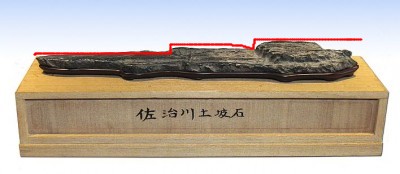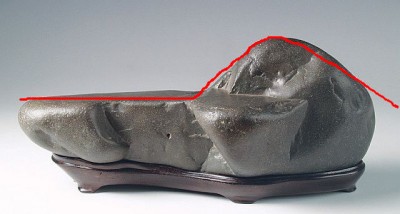ishi or seki
+5
trantanhung_nt
William N. Valavanis
peterbrod
Hans Vleugels
vlado
9 posters
Page 1 of 1
 ishi or seki
ishi or seki
....can someone explain what is the difference between ,,seki,, and ,,ishi,, ? Is it grammar, or system of classifying ?
vlado
vlado
vlado- Member
 Re: ishi or seki
Re: ishi or seki
Maybe seki = stone, and ishi = rock ???? Not sure about this, but a good question...

Hans Vleugels- Member
 Re: ishi or seki
Re: ishi or seki
Peter I think that you are not right because of , for example ,,sugata ishi ,, is not a hill, and ,,baika seki,, is not a stairway (to heaven...) 
vlado- Member
 Re: ishi or seki
Re: ishi or seki
I am not certain, but I believe there are two pronunciations for each Chinese kanjii which the Japanese use for their language. Perhaps "Ishi" is the Chinese and "Seki" is the Japanese?
If we don't figure it out here, I'll ask when I'm in Japan in November.
Bill
If we don't figure it out here, I'll ask when I'm in Japan in November.
Bill

William N. Valavanis- Member
 Re: ishi or seki
Re: ishi or seki
Hello Vlado ,
Hello Mr. Wylliam N. Valavanis ,
Many thanks for You , but thoses knowledgeable about SUISEKI may help us understand right now , please ...
Thank you ,
Sincerely ,
Hưng - Trần .
Hello Mr. Wylliam N. Valavanis ,
Many thanks for You , but thoses knowledgeable about SUISEKI may help us understand right now , please ...
Thank you ,
Sincerely ,
Hưng - Trần .
trantanhung_nt- Member
 Re: ishi or seki
Re: ishi or seki
Hi Hung Tran... Bill (William) Valavanis is very knowledgeable about suiseki... and right about language, too, though it is a little complicated in this context. It is also over my head; I am not a linguist and can't converse well in either language. Still, I am a serious student.
There are on & kun Japanese readings for words. The on reading is Sino-Japanese or the Chinese-derived reading. Seki is the most common on reading for "stone." The kun reading is the native Japanese reading. Ishi is the kun reading for "stone" and is also the 112th "radical" for "stone." Radicals are the bedrock upon which many words are built in combination.
Euphonics (creating a pleasant sound) has much to do with choices of words, and I would speculate the choice between seki and ishi has more to do with pleasant sound combinations than with function.
For a compound word composed of several characters, there should be consistency of either on or kun. Therefore, if you are hell bent on using the kun reading "ga" to mean "elegant" when combined with the character for "stone," then you must choose the kun reading "seki" (not the on reading "ishi") to create the word gaseki/"elegant stone."
A common Chinese (Mandarin, PRC) reading for stone is shi, and the Chinese pronunciation dan is also used for the same character.
I hope a linguist will clarify for all of us. Bill knows just the source to tell us the backstory... :-)
There are on & kun Japanese readings for words. The on reading is Sino-Japanese or the Chinese-derived reading. Seki is the most common on reading for "stone." The kun reading is the native Japanese reading. Ishi is the kun reading for "stone" and is also the 112th "radical" for "stone." Radicals are the bedrock upon which many words are built in combination.
Euphonics (creating a pleasant sound) has much to do with choices of words, and I would speculate the choice between seki and ishi has more to do with pleasant sound combinations than with function.
For a compound word composed of several characters, there should be consistency of either on or kun. Therefore, if you are hell bent on using the kun reading "ga" to mean "elegant" when combined with the character for "stone," then you must choose the kun reading "seki" (not the on reading "ishi") to create the word gaseki/"elegant stone."
A common Chinese (Mandarin, PRC) reading for stone is shi, and the Chinese pronunciation dan is also used for the same character.
I hope a linguist will clarify for all of us. Bill knows just the source to tell us the backstory... :-)
Last edited by Chris Cochrane on Wed Sep 14, 2011 2:17 am; edited 1 time in total (Reason for editing : corrected typo)

Chris Cochrane- Member
 Re: ishi or seki
Re: ishi or seki
Chris Cochrane wrote:
A common Chinese (Mandarin, PRC) reading for stone is shi, and the Chinese pronunciation dan is also used for the same character.
I hope a linguist will clarify for all of us. Bill knows just the source to tells us the backstory... :-)
I am not a linguist, but you are right in the aforementioned statement.

jrodriguez- Member
 Re: ishi or seki
Re: ishi or seki
I think that Ernest T. Bass went around Mayberry throwing ishis through windows, not sekis.
That probably doesn't help.
That probably doesn't help.

Russell Coker- Member
 Re: ishi or seki
Re: ishi or seki
I contacted Yukio Murata, third generation of Kyuka-en Bonsai Garden in Omiya Bonsai Village in Japan. His grandfather, Kyuzo Murata, was a famous bonsai master as well as an authority on suiseki. Here is Yukio's reply on the topic of "ishi" and "seki":
Most Kanji have two pronunciations, one is "On yomi", the other "Kun yomi".
"On yomi" derives from the pronunciation of the Chinese language. "Kun yomi" is the Japanese pronunciation.
In this case, "Seki" is "On yomi" and "Ishi" is "Kun yomi".
Stones existed in Japan before the Kanji was imported into Japan, and people called stones "ishi".
When the Kanji meaning stone was imported into Japan, people used that Kanji to describe "ishi", thus the Kanji "seki" had two pronunciations, "seki" and "ishi".
In Kanji compounds, the way of pronunciation is BASICALLY consistent. "On yomi - On yomi" or "Kun yomi - Kumi yomi". (There are excepitions.)
"Sui - Seki" is "On yomi - On yomi" and "Do - Ha - Seki" is "On yomi - On yomi - On yomi".
In "Kun yomi", Suiseki is pronounced as "mizu ishi" and in this case, the meaning is very different. "Mizu ishi" may be understood as a person's last name or a name of a place.
As I mentioned above, "On yomi" derives from the pronunciation of the Chinese language, so we don't use "On yomi" in a conversation. We use "Kun yomi" because it is the original Japanese word.
When we mention stones (including suiseki), we say not "seki" but "ishi".
The Japanese word "ki" (tree) is pronounced as "moku" or "boku" in "On yomi", but we never say "moku" nor "boku" in a conversation meaning a tree.
Thank you very much for explaining this to the Internet Bonsai Forum Yukio. You were an excellent high school student!
Bill
Most Kanji have two pronunciations, one is "On yomi", the other "Kun yomi".
"On yomi" derives from the pronunciation of the Chinese language. "Kun yomi" is the Japanese pronunciation.
In this case, "Seki" is "On yomi" and "Ishi" is "Kun yomi".
Stones existed in Japan before the Kanji was imported into Japan, and people called stones "ishi".
When the Kanji meaning stone was imported into Japan, people used that Kanji to describe "ishi", thus the Kanji "seki" had two pronunciations, "seki" and "ishi".
In Kanji compounds, the way of pronunciation is BASICALLY consistent. "On yomi - On yomi" or "Kun yomi - Kumi yomi". (There are excepitions.)
"Sui - Seki" is "On yomi - On yomi" and "Do - Ha - Seki" is "On yomi - On yomi - On yomi".
In "Kun yomi", Suiseki is pronounced as "mizu ishi" and in this case, the meaning is very different. "Mizu ishi" may be understood as a person's last name or a name of a place.
As I mentioned above, "On yomi" derives from the pronunciation of the Chinese language, so we don't use "On yomi" in a conversation. We use "Kun yomi" because it is the original Japanese word.
When we mention stones (including suiseki), we say not "seki" but "ishi".
The Japanese word "ki" (tree) is pronounced as "moku" or "boku" in "On yomi", but we never say "moku" nor "boku" in a conversation meaning a tree.
Thank you very much for explaining this to the Internet Bonsai Forum Yukio. You were an excellent high school student!
Bill

William N. Valavanis- Member
 Re: ishi or seki
Re: ishi or seki
Many thanks Bill
For this easy to understand explaination , interesting to know.....
, interesting to know.....
Kind regards Yvonne
For this easy to understand explaination
Kind regards Yvonne
Guest- Guest
 Re: ishi or seki
Re: ishi or seki
Bill,
Thank you for investigating this further, however, the Chinese word for stone is Shi (similar to ishi). If "Kun Yomi" is the Japanese pronunciation and "On Yomi" is the derivation from the Chinese pronuncitation, where does the Seki come from? Seki is definitely not the word for stone in Chinese nor has any resemblance to its pronunciation.
Kind regards,
Jose Luis
Thank you for investigating this further, however, the Chinese word for stone is Shi (similar to ishi). If "Kun Yomi" is the Japanese pronunciation and "On Yomi" is the derivation from the Chinese pronuncitation, where does the Seki come from? Seki is definitely not the word for stone in Chinese nor has any resemblance to its pronunciation.
Kind regards,
Jose Luis

jrodriguez- Member
 Re: ishi or seki
Re: ishi or seki
Hello IBC Forum - Members ,
Hello Vlado ,
Now , we can understand and distinguish between ISHI and SEKI ...
However , we can better understand ... If there is an explanation of a linguist ( as Mr. Chris Cochrane he say ... )
Thank you very much all us .
Sincerely ,
Hưng - Trần .
Hello Vlado ,
Now , we can understand and distinguish between ISHI and SEKI ...
However , we can better understand ... If there is an explanation of a linguist ( as Mr. Chris Cochrane he say ... )
Thank you very much all us .
Sincerely ,
Hưng - Trần .
trantanhung_nt- Member
 Re: ishi or seki
Re: ishi or seki
Thanks, Bill, and thanks to Yukio Murata. Thanks, Jose Luis.
Respectfully, the explanation is a little confusing when Bill relays,
By choosing to use the On reading, a Japanese speaker would be acknowledging a word's derivation from Chinese. Perhaps, this is the sole key to using one over the other-- choice explains the derivation of a word as a native Japanese form or 'borrowed from China' form.
As Jose Luis notes, the Japanese "borrowed from China" form is not Chinese pronunciation. "Bonsai" is the Japanese form borrowed from China; "pen + zai" is the Chinese form. The pronunciation may or may not be close between Chinese (Mandarin/PRC) and Japanese On reading.
Additionally, modern Western words are added to conversational Japanese. They are not written in Kanji (Chinese) characters but in phonetic katakana. Older words can also be written phonetically using hirigana (it captures the same sounds but is more round in form than the squarish katakana). Hirigana helps a reader understand which form to use in reading less familiar characters, so occasionally it will be seen as a small subscript alongside the Chinese-style characters.
I agree with you, Hung Tran, that we still need clarification for closure. I am not a reliable source and know just enough to likely make mistakes in trying to clarify.
Respectfully, the explanation is a little confusing when Bill relays,
For the On yomi (yomi translates as "reading") of the characters "sui + seki" Japanese use the On reading rather than the Kun reading, which is mizuishi as is explained by Bill. The two characters for bonsai only have an On reading; there is no Kun reading for "bon + sai." Bonsai is used in conversation and not just a written form. A Japanese enthusiast would understand the spoken phrase "Bonsai no kokoro." Bonsai is an On reading; kokoro is a Kun reading. I think Japanese language is built upon both forms for writing and conversation.As I mentioned above, "On yomi" derives from the pronunciation of the Chinese language, so we don't use "On yomi" in a conversation. We use "Kun yomi" because it is the original Japanese word.
By choosing to use the On reading, a Japanese speaker would be acknowledging a word's derivation from Chinese. Perhaps, this is the sole key to using one over the other-- choice explains the derivation of a word as a native Japanese form or 'borrowed from China' form.
As Jose Luis notes, the Japanese "borrowed from China" form is not Chinese pronunciation. "Bonsai" is the Japanese form borrowed from China; "pen + zai" is the Chinese form. The pronunciation may or may not be close between Chinese (Mandarin/PRC) and Japanese On reading.
Additionally, modern Western words are added to conversational Japanese. They are not written in Kanji (Chinese) characters but in phonetic katakana. Older words can also be written phonetically using hirigana (it captures the same sounds but is more round in form than the squarish katakana). Hirigana helps a reader understand which form to use in reading less familiar characters, so occasionally it will be seen as a small subscript alongside the Chinese-style characters.
I agree with you, Hung Tran, that we still need clarification for closure. I am not a reliable source and know just enough to likely make mistakes in trying to clarify.

Chris Cochrane- Member
 Re: ishi or seki
Re: ishi or seki
Hi Chris
It is interesting reading....very complex. Thanks for trying to explain....
Kind regards Yvonne
It is interesting reading....very complex. Thanks for trying to explain....
Kind regards Yvonne
Guest- Guest
 Re: ishi or seki
Re: ishi or seki
Dear friends, many thanks to you all , for explanation.
Question was simple and I think explanation is very interesting and important.
Have a nice day.
Vlado
Question was simple and I think explanation is very interesting and important.
Have a nice day.
Vlado
vlado- Member
 Similar topics
Similar topics» Kuromatsu gan-seki-sho shohin
» my Dan-seki
» Seki (tabletop) display
» seki shop talk
» Summertime seki display
» my Dan-seki
» Seki (tabletop) display
» seki shop talk
» Summertime seki display
Page 1 of 1
Permissions in this forum:
You cannot reply to topics in this forum|
|
|









